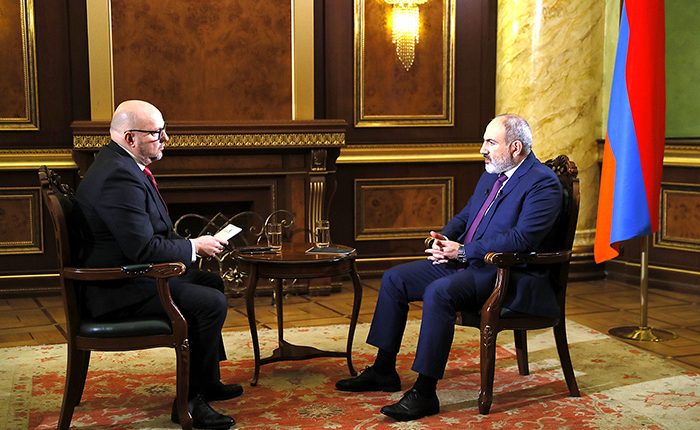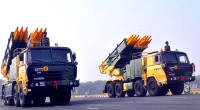YEREVAN — In an interview with the Wall Street Journal published on Wednesday, Armenian PM Nikol Pashinyan stated that Yerevan is now striving to diversify its foreign and security policies after Moscow failed to live up to its commitment as an ally following Azerbaijani aggression on the territory of Armenia.
“The Collective Security Treaty and the Charter of the Collective Security Treaty Organization clearly state the actions to be taken when aggression against a member state occurs. What was described did not happen, and, of course, it is disappointing for both the Armenian government and the Armenian public.
Also, we have a bilateral agreement with Russia in the field of security, and the actions described in that agreement also did not take place, which also raised very serious questions among both the government and the public,” the Armenian premier said.
Replying to the journalist’s question about whether this means that Armenia is planning to call for Russia to withdraw its military base from its territory, Nikol Pashinyan said:
“We are not discussing such a question. We are now more focused on discussing other issues, trying to understand the cause of such a situation, and this will be the agenda of working discussions between Armenia and Russia, as well as Armenia and the Collective Security Treaty Organization.” Pashinyan responded.
In response to another question about whether Russia’s military presence in Armenia is an asset or a liability, Pashinyan said:
“At least at this moment, I have already stated that, unfortunately, we have not seen the advantages in the context of the cases I have described.
“In general, after the failure of the peacekeeping contingent of the Russian Federation in Nagorno-Karabakh, many questions arise. These questions are legitimate because, by saying ‘failure,’ I mean that it is a fact that the peacekeeping troops of the Russian Federation were unable or unwilling to ensure the safety of the Armenians in Nagorno-Karabakh,” the Armenian premier noted.
PM Pashinyan was asked whether he had concerns that a full-scale war with Azerbaijan could spread to the territory of sovereign Armenia and what Armenia’s allies and partners should do to prevent it.
“I would, however, separate the issue of ethnic cleansing in Nagorno-Karabakh and the issue of more than 100 thousand new refugees and military operations against Nagorno-Karabakh from the question of Azerbaijan’s possible aggression against Armenia. Of course, I will not say that there are no correlations between these issues, but they are separate issues.
“Of course, we hope that in the near future, the agreements reached at the quadrilateral meeting in Prague on October 6, 2022, at the trilateral meeting in Brussels on May 14, 2023, and at the trilateral meeting in Brussels on July 15, 2023, will be formalized, reaffirmed, and become the basis for the peace treaty. I want to remind you of the agreements expressed in the statement of the President of the European Council and the Prague statement.
“The first principle is that Armenia and Azerbaijan mutually recognize each other’s territorial integrity. This provision was agreed upon at the Prague meeting, and on May 14, 2023, another step was taken in Brussels, where it was recorded that Azerbaijan recognizes the territorial integrity of 29,800 square km of Armenia, and Armenia recognizes the territorial integrity of 86,600 square km of Azerbaijan.
“The second principle is that the delimitation process between Armenia and Azerbaijan should take place on the basis of the 1991 Alma-Ata Declaration.
“What is special about it? Its peculiarity is that at the time of signing, the countries of the Soviet Union were already becoming or had become de facto independent countries, and with the Alma-Ata Declaration, they recorded that they recognized the existing Soviet administrative borders between the republics as state borders, recognizing the inviolability and territorial integrity of these borders. When we say that the delimitation of the borders should take place on the basis of the 1991 Alma-Ata Declaration, it means that the state maps existing at that time should be used as the basis for border delimitation.
“The third principle is that the opening of communications in the region, including the opening of roads and railways between Armenia and Azerbaijan for mutual and international trade, should take place on the basis of the principles of sovereignty, jurisdiction, equality, and reciprocity between the countries. These principles are practically agreed upon, and it remains to conclude a peace treaty based on these agreed principles and move forward.”










